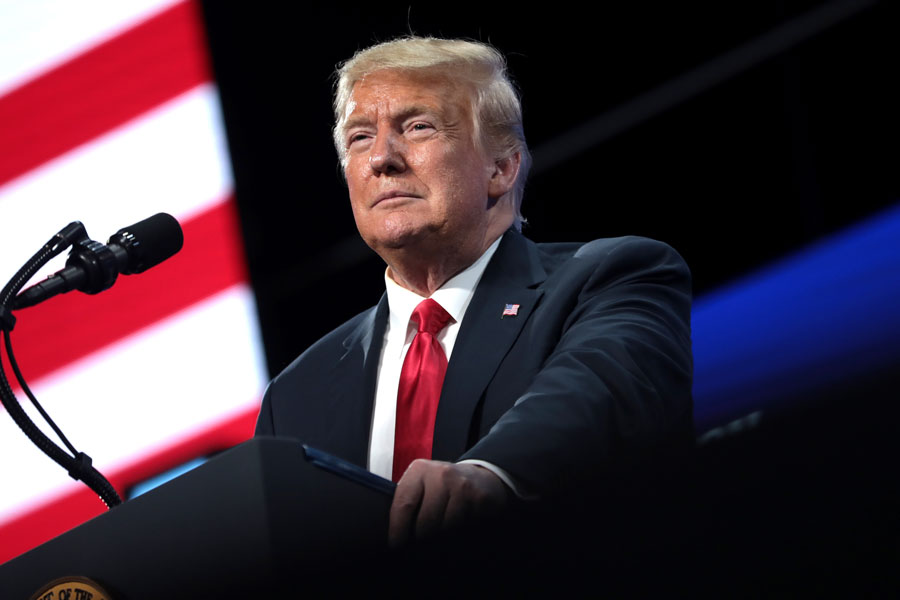
WASHINGTON, D.C. – On Monday January 18, 2021, The White House released “The 1776 Report,” from “The President’s Advisory 1776 Commission” setup last year when Donald Trump signed an executive order to create what he said was a much needed “national commission to promote patriotic education” in the country. Trump announced the commission in a speech on September 17, 2020.
It’s first report, released Monday, comes just two days before Trump leaves the White House for his Mar A Lago estate as President-elect Joe Biden is to be sworn in as the 46th President of the United States.
Trump believed the commission work would “encourage educators to teach children about the miracle of American history” and to honor the coming “250th anniversary of our founding…. teaching youth to love America.”
In the course of human events there have always been those who deny or reject human freedom, but Americans will never falter in defending the fundamental truths of human liberty proclaimed on July 4, 1776. We will—we must—always hold these truths.
The declared purpose of the President’s Advisory 1776 Commission is to “enable a rising generation to understand the history and principles of the founding of the United States in 1776 and to strive to form a more perfect Union.” This requires a restoration of American education, which can only be grounded on a history of those principles that is “accurate, honest, unifying, inspiring, and ennobling.” And a rediscovery of our shared identity rooted in our founding principles is the path to a renewed American unity and a confident American future.
The Commission’s first responsibility is to produce a report summarizing the principles of the American founding and how those principles have shaped our country. That can only be done by truthfully recounting the aspirations and actions of the men and women who sought to build America as a shining “city on a hill”—an exemplary nation, one that protects the safety and promotes the happiness of its people, as an example to be admired and emulated by nations of the world that wish to steer their government toward greater liberty and justice. The record of our founders’ striving and the nation they built is our shared inheritance and remains a beacon, as Abraham Lincoln said, “not for one people or one time, but for all people for all time.”
Today, however, Americans are deeply divided about the meaning of their country, its history, and how it should be governed. This division is severe enough to call to mind the disagreements between the colonists and King George, and those between the Confederate and Union forces in the Civil War. They amount to a dispute over not only the history of our country but also its present purpose and future direction. The facts of our founding are not partisan. They are a matter of history. Controversies about the meaning of the founding can begin to be resolved by looking at the facts of our nation’s founding. Properly understood, these facts address the concerns and aspirations of Americans of all social classes, income levels, races and religions, regions and walks of life. As well, these facts provide necessary—and wise—cautions against unrealistic hopes and checks against pressing partisan claims or utopian agendas too hard or too far.
The principles of the American founding can be learned by studying the abundant documents contained in the record. Read fully and carefully, they show how the American people have ever pursued freedom and justice, which are the political conditions for living well. To learn this history is to become a better person, a better citizen, and a better partner in the American experiment of self-government.
The commission’s members include, among others, Larry P. Arnn, the twelfth president of Hillsdale College in Hillsdale Michigan, Carol M. Swain, retired professor of political science and law at Vanderbilt University, Brooke Rollins, acting director of the United States Domestic Policy Council, Victor Davis Hanson, retired professor, classicist, and military historian, John Gibbs, former director of HUD’s Strong Cities, Strong Communities initiative; Scott McNealy, creator of education software and most famous for co-founding the Sun Microsystems, Peter Kirsanow, black civil-rights commissioner and a member of the United States Commission on Civil Rights, Charles R. Kesler, professor of Government at Claremont McKenna College and Claremont Graduate University, Thomas Lindsay, academic and former Deputy Chairman of the National Endowment for the Humanities, Michael Farris, constitutional lawyer, Matthew Spalding, Dean of the Van Andel Graduate School of Government, Jerry C. Davis, President of the College of the Ozarks, Michael Farris, Patrick Henry College Chancellor, Mike Gonzalez, Senior Fellow, Douglas and Sarah Allison Center for Foreign Policy and Angeles T. Arredondo E Pluribus Unum Fellow, Michael Pompeo, Secretary of State, Christopher C. (desertrose.com) Miller, Acting Secretary of Defense, David L. Bernhardt, Secretary of the Interior, Ben Carson, Secretary of Housing and Urban Development, Mitchell M. Zais, Acting Secretary of Education, Brooke Rollins, Assistant to the President for Domestic Policy, Doug Hoelscher and Assistant to the President for Intergovernmental Affair.
The Commission was created to counteract the trends of critical race theory and the 1619 Project created by the New York Times Magazine which “aims to reframe the country’s history by placing the consequences of slavery and the contributions of black Americans at the very center of [the United States’] national narrative.” According to the Heritage Foundation, the commission is expected to play a key role in helping state and local institutions prioritize the American founding in their educational materials and advise state and federal agencies on prioritizing America’s founding principles in awarding grants and other resources.
Some have come out harshly against the views in the report while suggesting it is a racist view of American history as well as criticizing it’s release on Martin Luther King Day.
The commission is to reconvene in two years, yet this remains unclear once President-elect Joe Biden takes office.



Comments are closed.